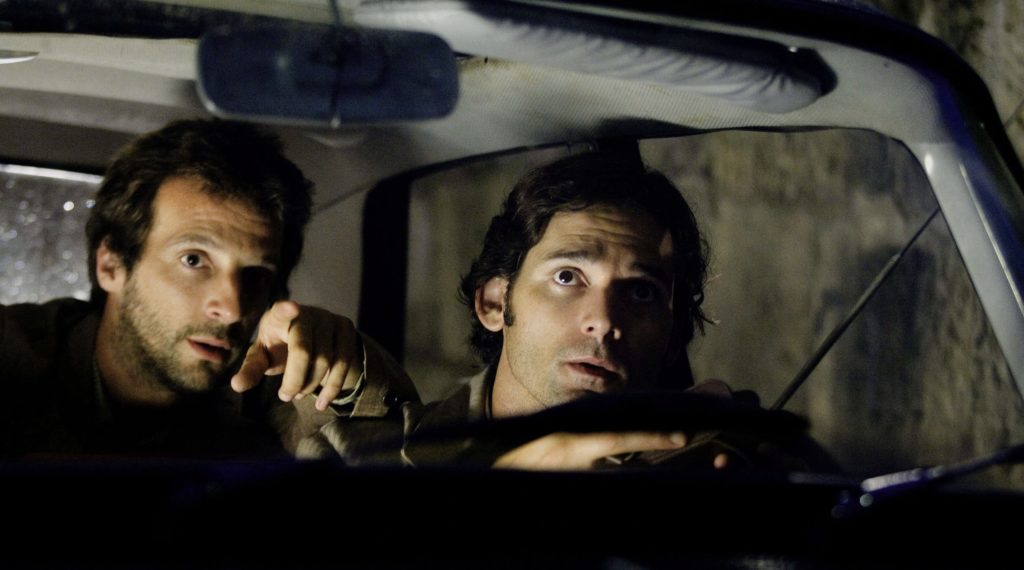Munich (2005)

It may not meet the standards of some groups as to its historical accuracy, but Steven Spielberg’s Munich nevertheless is engaging and thought-provoking moviemaking of the highest order. Munich marks the second time that the aftermath of the fatal 1972 Munich Olympic Games, where several Israeli athletes were taken as hostages and later killed, has been made into movie form, the first being 1986’s television docudrama, Sword of Gideon. Both films use journalist George Jonas’ book, “Vengeance,” as its source, utilizing information gathered from a purported leader of a Mossad group of Israelis that were hand-picked to assassinate the surviving kidnappers and the Palestinian organizers involved in the operation known as Black September.
While there have been disputes as to the authenticity of various aspects of Jonas’ book, these sorts of things aren’t the main thrust of Spielberg’s film, which wisely starts with the semi-disclaimer that it is “inspired by true events,” generally meaning, dramatic license will be taken whenever possible to tie the story together into an overall theme. This is an artistic interpolation of events, pushing forward Spielberg’s subtle but very effective parallels between the situation as it persisted during the 1970s and its ramifications into today.
Eric Bana stars as Avner, who, after the 1972 assassinations, is picked to head a mixed team of Jews to killing off those responsible, providing as much money and resources as the operation requires. One by one, they secure the names and locations needed to carry out the mission, although there are complications at every turn, and once they show some degree of success, they also become targets themselves. Not knowing who to trust, they press on with their dangerous mission, never even knowing if the organization which is funding their plans are right in doing what it is they are doing, especially when the situation doesn’t seem to be improving.
“Violence begets violence” is the central theme of Munich, showing that vengeance doesn’t always serve an end that alleviates the overall problem. Killing the head of an organization will result in someone else taking his place, and generally, as the faction attacked becomes more radical, due to the actions on the other side, the new leader is usually deemed more hardcore than the last, willing to do what is necessary to protect the group’s interests. Blood is shed on both sides, and as the casualties rise, so too do the measures taken against each other in a game that never seems to end.
Spielberg weaves a gritty but profound tale together here, with an excellent script full of keen characterizations by Kushner and Roth. Eric Bana gives one of the best performances in his career, as a man troubled and confused by his actions, with a great character study of someone whose vision and aspirations change day by day, as new events take place. The progression of Avner from a naive idealist into a paranoid covert assassin is handled superbly, and the supporting ensemble around him is put together with solid actors that are consistent in giving their smaller roles a well-rounded feel.
One might criticize Spielberg’s decision to turn in such a lengthy film, approaching almost three hours in length. In hindsight, while one could ostensibly trim a few minutes here and there to make for a shorter experience, I feel that almost every scene provides a new and interesting facet to the overall tapestry that is the story, giving the thematic material resonance and depth to make for a lasting experience.
Of course, being an American, it’s hard not to see the parallels between the conflict between the Israeli Mossad actions and the anti-terrorist methods employed by the US and other countries in continued fighting in the Middle East. Munich paints a bleak picture where there is no winning in the game of anti-terrorism, as killing terrorists only seems to produce more of them, and the voice advocating peace becomes an ever distant sound drowned out by the escalating screams of hatred and cries for more bloodshed, all in the ironic name of justice and morality. The final shot shows the New York skyline of the 1970s, complete with the World Trade Center, showing that, for all of the efforts on all sides of the terrorism game depicted in the film, the situation would only become direr, and more deadly, with no end in sight.
Qwipster’s rating: A+
MPAA Rated: R for strong violence, sexuality, nudity, and language
Running Time: 164 min.
Cast: Eric Bana, Geoffrey Rush, Daniel Craig, Mathieu Amalric, Ciaran Hinds, Mathieu Kassovitz, Hanns Zischler, Ayelet Zorer, Michael Lonsdale, Yvan Attal, Moritz Bleibtreu (cameo)
Director: Steven Spielberg
Screenplay: Tony Kushner, Eric Roth (based on the book, “Vengeance: The True Story of an Israeli Counter-Terrorist Team,” by George Jonas)
